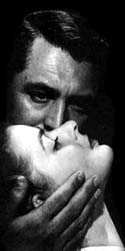

     by Elizabeth Abele -- page 4 of 4 by Elizabeth Abele -- page 4 of 4 |
 Conclusion Conclusion
Stojan Pelko ends his article "Punctum Caecum, or, Of Insight and Blindness" on vision in Hitchcock with:
If there is a common denominator to all Hitchcock's flirtings with the camera, it is to be sought in the realization that the hypnotic cinematographic disposition is female, and all its agents are women--Women who know too much. (119)
It may be as problematic for Pelko to insist that the perspective of Hitchcock's gaze is always female as it is to insist that, as Mulvey does, that it is always male. But I think Pelko is right to insist that the knowing female exists in Hitchcock, not just the controlling male spectator. Hitchcock was too fascinated with the possibilities of perspective, too much of an experimenter, to follow only one approach. Even if Mulvey is correct in her assertion that it makes a male audience uncomfortable to view the exhibition of a man as desired object, that would make Hitchcock more likely to try a perspective that would move away from audience expectations and comfort.
Overall, the simple economy that Mulvey describes in classic Hollywood cinema may have less to do with the simplistic construction of narrative rather than with the spectators' lack of experience with describing feminine desire, action, and knowledge. As we become better feminist (not necessarily female) readers, we can more fully understand the complex dynamics that operated in classic Hollywood films that inform our current narrative structures.
As Hitchcock must have respected actors more than he would let on, I also suspect that he had more respect for the strength, abilities, and possibilities of women than he would admit in print. He prefers to speak through his camera, watching these women who know too much try to deal with Hitchcock's lost men.
Works Cited
Modleski, Tania. The Women Who Knew Too Much: Hitchcock and Feminist Theory. New York: Methuen, 1988.
Mulvey, Laura. "Afterthoughts on 'Visual Pleasure and Narrative Cinema' inspired by Duel in the Sun." Feminism and Film Theory. Ed. Constance Penley. New York: Routledge, 1988.
Pelko, Stojan. "Punctum Caecum, or, Of Insight and Blindness." Everything You Always Wanted to Know About Lacan, But Were Afraid to Ask Hitchcock. Ed. Slavoj Zizek. London: Verso, 1992.
Silverman, Kaja. "Historical Trauma and Male Subjectivity." Psychoanalysis and Cinema. Ed. E. Ann Kaplan. New York: Routledge, 1990.
Studler, Gaylyn. In the Realm of Pleasure: Von Sternberg, Dietrich and the Masochistic Aesthetic. Urbana: U of Illinois P, 1988.
Zizek, Slavoj. "Alfred Hitchcock, or, The Form and its Historical Medium." Everything You Always Wanted to Know About Lacan, But Were Afraid to Ask Hitchcock. London: Verso, 1992. 1-14.
page 4 of 4
 
|